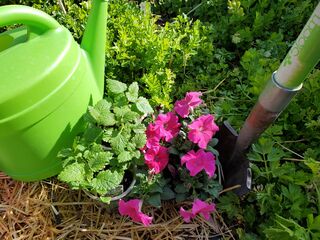Health
Why Gardening Is Good for the Body and the Brain
Gerdening provides healthy nutrition and improves mental health.
Posted April 25, 2022 Reviewed by Gary Drevitch

As Audrey Hepburn beautifully said, “To plant a garden is to believe in tomorrow.” I totally agree. Not everybody knows that she was not only a brilliant actress, but also an avid gardener. In her home in Switzerland, she had a large garden and used her crops not only for home cooking, but also for making homemade preserves, juices, marmalades, etc. I strongly believe that gardening is food for the body, mind, and spirit—and also very good brain exercise. Here is why?
Gardening provides fresh and healthy food
Many health professionals, myself included, believe that food is our medicine. Therefore, I encourage all my patients to do gardening wherever they can, even in pots on a balcony, patio, or windowsill. Any form of gardening is good for your health (Soga, M. et al. 2017). You’re eating fresh produce full of great natural nutrients, not like produce that’s been traveling long distances and has been in grocery stores for who knows how long, since nowadays, there are many different ways to preserve produce. You can choose the seeds you put into the soil, and you know what fertilizers you put in. I encourage you to use organic seeds and organic fertilizers; as a result, you’ll know what you’re eating.
Every day you can make a fresh salad from different combinations of fresh greens and vegetables by picking a few leaves from different plants. You are not wasting any food, because you only pick as much as you need for your meal. When you bring your garden treasures to your kitchen, you’ll be overwhelmed by their fresh, natural, and wonderful smell. When I have friends around, I let them smell the contents of my garden basket even before I prepare the salad to let them experience the wonderful freshness of it. Eating such a wonderful fresh meal is an experience not only for your body but also for your mind and spirit. Eat your meal slowly and taste its goodness. Its fresh smell will speak to your mind and make you feel better, not only physically but also emotionally. When you bring a feeling of pleasure to your mind, your spirit should brighten.
Gardening exercises your body
When you garden, you get your daily dose of exercise (Sommerfeld, A.J. et al 2010), which is good for overall health and especially the prevention of cardiovascular disease. As a matter of fact, gardening can be considered an aerobic and muscular exercise. It usually requires a lot of movement. It also restores dexterity and strengths. Digging, weeding, and raking are calorie-intensive activities. Fertilizing, planting, mulching, etc., when you have to carry a large load, gives you a good strength workout. Also, you are outside, breathing the fresh air and not exposing yourself to all kinds of indoor pollutants.
Gardening exercises your brain
Gardening is a great brain exercise. It helps improve and/or preserve your cognitive functions. (Park, S-A. et al. 2019). It requires a lot of planning and organizing, and you can see the results of your work. There are many decisions you’ll need to make at the beginning of and throughout the growing season, since unexpected things may happen. You’ll have to problem solve all the time, which is a great exercise for your brain. You’ll have to decide what kind of plants you want to grow, how many, and where you’ll be planting them in the garden. Try to grow some new things every year. You’ll need to spend some time studying the new plants and deciding which varieties would be best for your garden. You’ll have to take into consideration the climate (growing zone), your soil conditions, and how many hours of sun or shade your plants will require. Then, there’s a planting time according to the schedule that you’ve prepared.
Most vegetables won’t grow when the temperature is above 85 degrees Fahrenheit, so you’ll need to plant them early in the season. When it comes to problem-solving, you’ll learn a good deal from the experience of gardening. Prepare for a lot of unexpected things: Some seeds may not germinate, even if you bought them from an expensive catalog, and you’ll need to figure out what you can do next. You can look for other seeds or buy something different from a local nursery. When your plants are growing, they’re subject to diseases, insects, and predators (like gophers, pack rats, squirrels, and birds, which like to pick on the fresh and juicy sprouting seedling). You’ll need to observe carefully and learn to recognize the signs of problems and how to deal with them. When plants mature, you can see their beauty and bring to the kitchen a full basket of fresh greens or veggies. This is your great reward, which is worth all the work.
Gardening calms your mind
Most gardeners seem to be calm and content people and now research tells us why: There is a bacterium in a soil called Mycobacterium vaccae that has anti-inflammatory and immunoregulatory properties that could protect against stress and anxiety (Smith, D.G. et al. 2019). It may also stimulate serotonin production which regulates mood, anxiety, and happiness. There is growing research on the positive effect of gardening on mental health (Stowell, D.R. et al. 2018). Gardening helps reduce stress, anxiety, and depression. It also helps overcome the effects of the coronavirus pandemic (Zhang,X. et al 2021). Also, any green spaces, and especially home gardens, are great places to meditate. You can meditate while looking at the beauty of the flowers and roses in your garden and be thankful that you can see them, because the colors you can see in nature cannot be compared to anything else.
References
Soga, M. et al. “Gardening is beneficial for health: A meta-analysis.”Prev Med Rep. 2017 Mar; 5: 92-99
Sommerfeld, A.J. et al. “Growing Minds: Evaluating the Effect of Gardening on Quality of Life and Physical Activity Level of Older Adults.” Hort Technology 2010. Volume 20: Issue 4
Sommerfeld, A.J. et al. “Growing Minds: Evaluating the Effect of Gardening on Quality of Life and Physical Activity Level of Older Adults.” Hort Technology 2010. Volume 20: Issue 4
Park, S-A. et al. “Benefits of Gardening Activities for Cognitive Function According to Measurement of Brain Nerve Growth Factor Levels”. Int J Environ Res Public Health 2019 Mar; 16 (5): 760.
Smith, D.G. et al. “Identification and characterization of a novel anti-inflammatory lipid isolated from Mycobacterium vaccae, a soil-derived bacterium with immunolegulatory and stress resilience properties”. Psychopharmacology 2019, 236, 1653-1670
Stowell, D.R. et al. “ A pilot horticultural therapy program serving veterans with mental health issues: Feasibility and outcomes.” Complement Ther Clin Pract 2018 Aug; 32:74-78
Zhang, X. et al. “Home Gardens with Eco-Healing Functions Benefiting mental Health and Biodiversity During and after the COVID019 Pandemic: A Scoping Review. Front. Public Health, 11 November 2021


